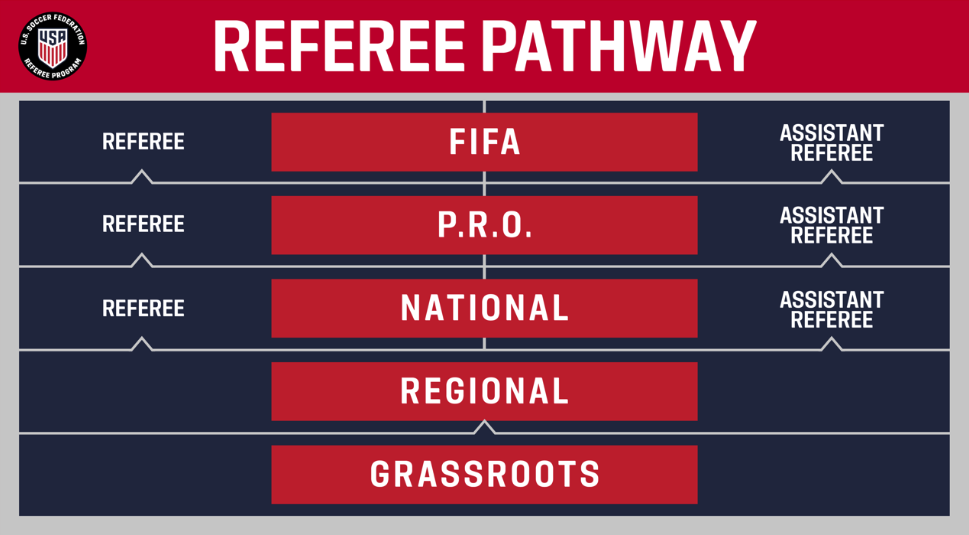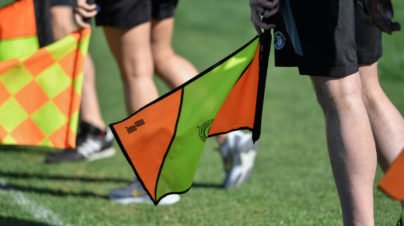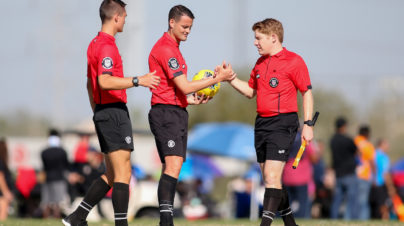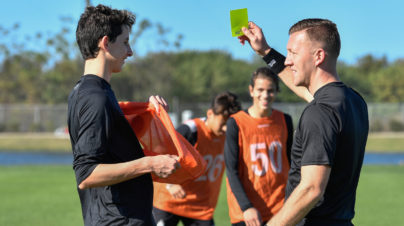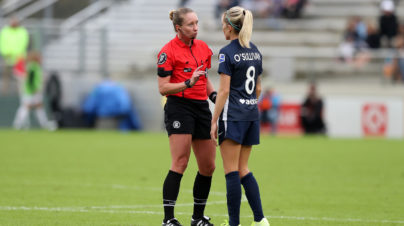How Do I Become a U.S. Soccer Referee in South Texas?
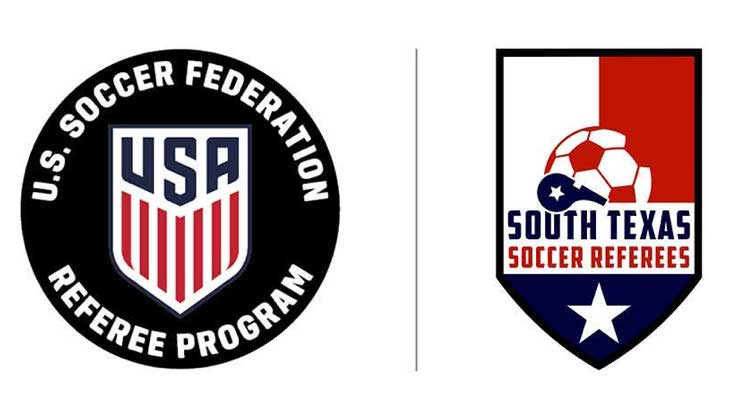
By Adam Schwager
SoccerWire Staff Writer and Certified Referee
Becoming a referee can become a difficult process to navigate. Sometimes, it can feel like the hurdles to jump through aren’t even worth your time and effort. With this resource, we hope to simplify the process, listing out everything you need to know in easy and understandable instructions.
Why Should I Become A Referee?
There are a multitude of reasons to become a referee, some of which we laid out last fall. If I had to give a concise answer to this question, it would be to capture that competitive edge that can leave you if you leave the game. Chances are, every one of our playing days are limited. So many people find themselves graduating high school and phased out of the sport. Even among the talented few that find themselves playing Collegiately, very few end up playing competitively past their school days. Yes, you might join an adult recreational or amateur team, but that feeling of raw competitiveness just isn’t the same.
With refereeing, you get to be in the heart of the action again. And while you’re not competing against another team, you’re competing against yourself to be the best referee you can be. After every game you can identify areas of improvement for yourself to work on, and over time you can feel your game elevate to new levels.
How Does the Referee System Work?
In the United States, all club referee certifications are handled by U.S. Soccer, which operates under the International Football Association Board (IFAB), and teaches their Laws of the Game. U.S. Soccer sets up a clear pathway for referees to climb all the way to becoming a FIFA-certified referee, the highest level that allows referees to officiate international games.
To enter the referee ranks, all beginners must start at the Grassroots level. Don’t be mistaken, even though Grassroots is the lowest level available, the designation provides you with the ability to referee a vast majority of competitive youth competitions, adult amatuer matches and recreational matches. The assignments you’ll be able to receive under a Grassroots license will certainly hold you over for at least a couple of years as you develop your skills to move your way towards a Regional certification if later desired.
What Qualifications Do I Need to Become a Referee in South Texas?
- Be 13 years of age or older
- The ability to understand and comprehend the Laws of the Game
- Strong communication skills to work with assignors, fellow referees, coaches and players.
- The ability to pass a U.S. Soccer Federation Gold Standard NCSI Background Check (18+).
- A level of fitness that allows you to keep up with the pace of play. You don’t have to be a physical specimen, but if you have trouble running without gasping for breath, refereeing may not be the best option for you at the moment.
How Do I Become a Grassroots Referee in South Texas?
Create an Account in the U.S. Soccer Learning Center
To register for a class in South Texas, you need to head to the U.S. Soccer Learning Center and create an account.
Register for a class
Once you’ve signed up for your account, you need to register for a class. When you go to the registration page, U.S. Soccer will automatically show you classes for the location you’re currently located in, so if you’re registering from out-of-state, select Texas from the location drop-down menu. Since North Texas uses a wholly different system for their registration, all classes listed under Texas are for South Texas.
Select a “Grassroots – First-time Referee Course” and sign up. Look for a time and location that works best for you. It’ll cost you $70 up-front, and once you’ve paid, you’ll be registered and allowed to complete your background check information.
Complete a Background Check (18+)
If you’re over the age of 18, you will need to complete an NCSI Background Check to work as a referee in Texas. With an additional $30, you will register to receive this two-year license through the US Soccer Learning Center. You will not be allowed to complete your online training until you pass your background check, which can take anywhere from 7-10 days to complete. It is highly recommended that you register for your background check immediately after registering for your course.
If you are under the age of 18 you can skip immediately to step 5.
Complete SafeSport Training (18+)
Aspiring referees 18 and older must also complete the hour-long SafeSport clinic, a fairly new governmentally-required training designed to help all officials involved in youth sports identify and report abusive behaviors to help keep our young athletes safe.
Complete Online Modules through the U.S. Soccer Learning Center
When you’ve signed up for the class, completed your background check and dealt with the SafeSport, you will receive access to two modules, the “Introduction to Safe and Healthy Playing Environments” and “Online Grassroots Referee Course”. In total, this takes about 4.5 hours to complete, but you aren’t required to complete the entire course in one sitting.
This course contains all the basic information on the Laws of the Game and how to enforce them. If you want to be as prepared as possible for your first day on the job, it’s important that you take this step very seriously and pay close attention. Note-taking is recommended as you will have a quiz to test your knowledge upon conclusion.
Take the Grassroots Online Test
You will capstone your online training with a test to check your knowledge. The sooner you take your test, the fresher the material will be, so try not to procrastinate. The best way to complete the training is by blocking off a 5-hour window to complete the modules and take the online test in one sitting.
Attend Your In-Person Training
After completing all the online training modules, you will be eligible to attend your In-Person Training session. Under normal circumstances, you would head to a nearby location and meet with other aspiring referees to run through practical exercises to help reinforce the material in the online course. During the Covid-19 pandemic, all “In-Person” training sessions have been replaced with a virtual group call. It is very possible that “In-Person” classes will resume for the 2022 registration season starting in late summer.
Receive Your Badge
Congratulations! Once you’ve fully completed all the previous steps, you will receive your badge, either at the in-person session or later through the mail. Contact some assignors and get working!
Finding and Contacting Assignors in South Texas
So you got your badge, now what? Without access to game assignments, you’ve just wasted a couple hundred dollars on a referee course and equipment.
The most important relationships you will have in your tenure as a referee is with your assignors. Luckily, South Texas Soccer Referees (STSR), has a very convenient “Find an Assignor” section on their website, which removes so much of the hassle. Instead of having to search for and find an assignor, just go to their website, answer a few questions about your experience level, age and geographical restrictions, and STSR will find an assignor for you.
Frequently Asked Questions (FAQ)
Q: Which part of the state counts as “South Texas”?
A: The boundaries of the South Texas Youth Soccer Association (STX Soccer) isn’t set on a specific longitude boundary, but varies city-to-city. Austin, Houston, and everything south of those cities are a part of STX Soccer, while everything north of the Dallas-Ft. Worth area is not. STX Soccer has the far west and far east of the middle part of Texas, specifically El Paso and Larkin. On the contrary, cities like Odessa, San Angelo and Waco are not a part of STX Soccer, despite being located south of El Paso.
If you don’t actually live in South Texas, check out our accompanying article, “How to Become a Referee in Northern Texas.”
Q: What equipment will I need? How much will it cost?
A: To referee your first game you will need a full jersey set, which includes at least the yellow referee jersey (ideally get both yellow and green to start), referee shorts, referee socks, cards, flags and a whistle. You can find a package from Official Sports, the exclusive USSF uniform supplier, that includes everything you need to start day one for as little as $50.95 plus shipping and handling. Additionally, everything you buy as a part of your refereeing career is considered a work expense, making it tax deductible at the end of the year.
Q: How much money can I earn?
A: The amount you can earn varies depending on a multitude of factors, including the age of the players you are refereeing, the leagues and tournaments in which you plan to officiate and what type of event you are officiating. For example, league games tend to pay more per game, but have longer game lengths while tournaments generally pay less on a per game basis, but have truncated game lengths that allow referees to work more in a given day.
While this shouldn’t be treated as gospel, a good rule of thumb for youth games is that for every minute of game length, an assistant referee makes about $0.50, while a center referee makes around $0.70-$1.00. That would mean in a standard 90-minute game each assistant would make $45 while the center would make $63-$90.
Q: How do I get paid? And how often?
A: Different assignors and competitions have different forms of payment, which come with differing payment speeds. A select few leagues offer cash payment directly to the referee on the field, but most competitions pay the assignor who then pays the money to referees either via direct deposit through assigning applications, or through cumulative checks sent to home addresses.
Q: What’s the best way to practice and improve quickly?
A: The best way to practice is to work your own games! You can spend as much time as you like thinking about refereeing in theory, but until you’re out there, on the pitch, making your own calls, you won’t be able to understand what refereeing is truly like. Let your assignors know your skill level and the level of competition you feel comfortable with, and they can help get you some games that will help improve your skills.
Also, be receptive to constructive criticism from your teammates. When you’re a fresher referee, your assignors will generally try to place you with some veterans who have worked hundreds, if not thousands of games. They will have great advice for you as you begin your journey in the referee world.
SOCCERWIRE MARKETPLACE
- Start the Season Strong at Loudoun Premier Cup!
- 50th Annual Rael Vodicka Memorial Tournament
- Soccer Marketing Internships at The St. James FC
- Job Opening: The St. James FC Goalkeeper Academy Coach
- Full-Time Director of Goalkeeping for The St. James FC
- visitRaleigh.com Showcase Series 2025, hosted by NCFC Youth
- Join Official Elite Summer Soccer Camps with Europe’s Top Pro Clubs!
- OFFICIAL BAYERN MUNICH SUMMER CAMPS U.S.
- OFFICIAL FC BARCELONA CAMPS U.S.
- The Cup San Diego - Hosted by Legends FC

